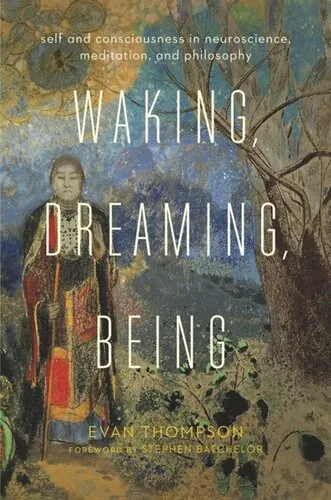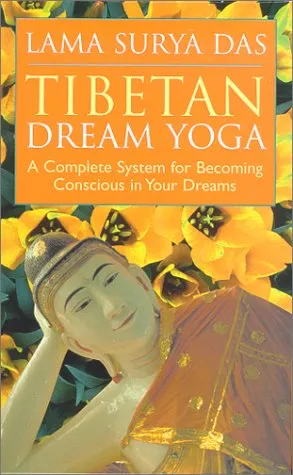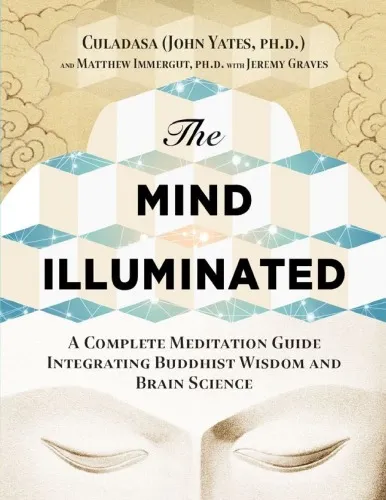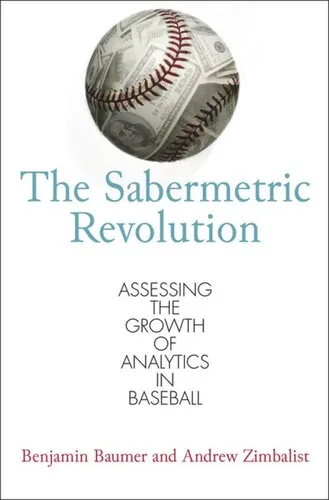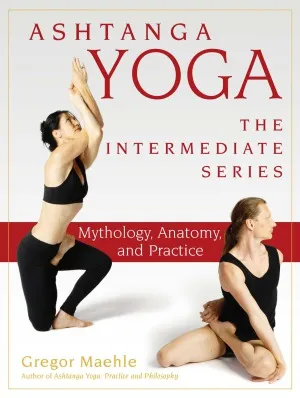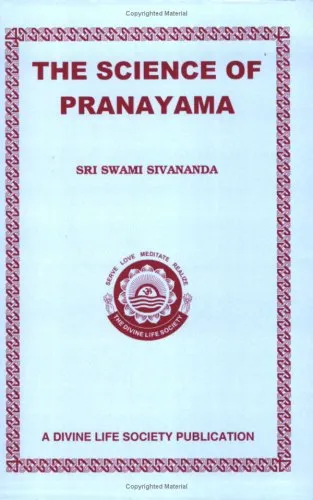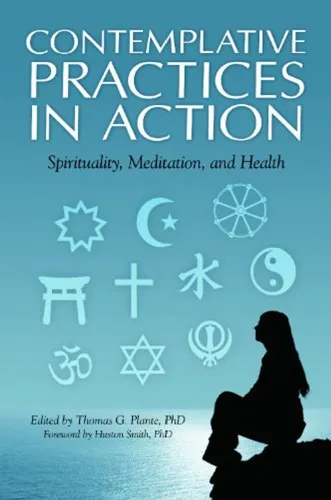Waking, Dreaming, Being: Self and Consciousness in Neuroscience, Meditation, and Philosophy
4.5
بر اساس نظر کاربران

شما میتونید سوالاتتون در باره کتاب رو از هوش مصنوعیش بعد از ورود بپرسید
هر دانلود یا پرسش از هوش مصنوعی 2 امتیاز لازم دارد، برای بدست آوردن امتیاز رایگان، به صفحه ی راهنمای امتیازات سر بزنید و یک سری کار ارزشمند انجام بدینکتاب های مرتبط:
معرفی کتاب
کتاب Waking, Dreaming, Being: Self and Consciousness in Neuroscience, Meditation, and Philosophy نوشته ایوان تامپسون و استیون بچلور، اثری فراگیر است که زمینههای مختلفی مانند علم عصبشناسی، مدیتیشن و فلسفه را به هم پیوند میدهد. این کتاب سفری عمیق درون ذهن و آگاهی انسانی است که به کاوش دقیق میان سه حالت ذهنی بیداری، رؤیا و وجود میپردازد.
خلاصهای از کتاب
ایوان تامپسون، با بهرهگیری از دانش روز علم عصبشناسی و مشاهدات باستانی مدیتیشن، به بررسی روابط پیچیدهای میپردازد که مشخص میکند چگونه آگاهی و حسی از "خود" در شرایط مختلفی ایجاد و تجربه میشود. او در این کتاب به تحلیل اصول علمی و مذهبی میپردازد و نشان میدهد که چگونه میتوان با استفاده از هر دو حوزه، درک عمیقتری از ذهن انسان به دست آورد.
مهمترین نکتهها
- تحقیق عمیق در مورد حالتهای ذهنی مختلف، از جمله بیداری، خواب و رؤیا.
- بررسی نقش مدیتیشن در تغییر و شکلگیری آگاهی.
- پیوند دادن نظریات علمی جدید با فلسفههای کهن برای ایجاد دیدگاهی جامع در مورد خودآگاهی.
نقلقولهای مشهور از کتاب
ایوان تامپسون: "آگاهی چیزی نیست که تنها در درون ما اتفاق میافتد، بلکه به تجربه ما از جهان و تعاملاتمان با دیگران نیز وابسته است."
استیون بچلور: "نفس یا خود، همواره در حال تغییر و شکلگیری است و مدیتیشن به ما کمک میکند این روند را بهتر درک کنیم."
چرا این کتاب مهم است
این کتاب نهتنها به علمیترین روش ممکن به بررسی آگاهی میپردازد، بلکه با تکیه بر هزاران سال حکمت و دانش فلسفی، نگاهی چندبعدی به خودآگاهی ارائه میدهد. خواندن این کتاب برای کسانی که به عصبشناسی، فلسفه، یا مدیتیشن علاقهمندند و میخواهند شناخت عمیقتری از "وجود" خود و دنیای پیرامونشان پیدا کنند، ضروری است. ایوان تامپسون و استیون بچلور با بهکارگیری رویکردی بینرشتهای، خواننده را به تأمل و تفکر دعوت میکنند و او را در مسیری جدید از شناخت خود و جهان هدایت میکنند.
Welcome to an exploration of the dynamic interplay between neuroscience, meditation, and philosophy in "Waking, Dreaming, Being: Self and Consciousness in Neuroscience, Meditation, and Philosophy" by Evan Thompson and Stephen Batchelor. This profound work brings together the threads of Western scientific inquiry and Eastern contemplative insights to weave a comprehensive narrative about the nature of self and consciousness. Let us delve into the rich offerings of this book with a detailed summary, key takeaways, famous quotes, and an elucidation of why this book holds significant importance.
Detailed Summary of the Book
"Waking, Dreaming, Being" provides an integrative perspective on what it means to be conscious and how this relates to the notion of self. Spanning over the lived experiences of waking, dreaming, and deep sleep, the authors examine these states through the lens of cognitive neuroscience, philosophical analysis, and the meditative practices of Buddhism and Advaita Vedanta.
The book considers how the brain and body create a sense of self and identity during the waking state, how dreaming provides insight into consciousness and creativity, and how deep sleep challenges our understanding of self-awareness and existence. Through the juxtaposition of scientific studies and meditative philosophies, Thompson and Batchelor invite readers to consider consciousness as a dynamic process rather than a static entity.
Key Takeaways
- Interconnectedness of States: The book illustrates how waking, dreaming, and being are interconnected states of consciousness, each offering unique insights into the nature of selfhood.
- Questioning the Self: It challenges the conventional understanding of a fixed self, proposing a fluid and transformative conception of identity shaped by both internal and external factors.
- Meditative Insights: Incorporating contemplative practices into daily life can enrich our understanding of consciousness and promote mental well-being.
- Scientific and Philosophical Convergence: The integration of neuroscience with philosophical thought and meditation rituals showcases how these domains can collaboratively enhance our comprehension of the mind.
Famous Quotes from the Book
"Just as a spider spins its web and then lives in it, so do humans create a cognitive web that they inhabit."
"Waking, dreaming, and being show us that the consciousness we experience is not merely a product of the brain but an ensemble of relationships between the body, the brain, and the world."
Why This Book Matters
"Waking, Dreaming, Being" contributes significantly to the discourse on consciousness by bridging Eastern and Western perspectives, thereby fostering a holistic understanding of the self. Its interdisciplinary approach serves as a crucial reminder that consciousness studies cannot be confined to a single domain but must embrace the insights from diverse fields. The book's exploration of how ancient meditation traditions can inform scientific inquiries makes it a pivotal resource for anyone interested in the depth and breadth of human consciousness. Moreover, as we continue to advance in fields like artificial intelligence and cognitive science, understanding consciousness from a broader perspective becomes increasingly vital.
Ultimately, the book challenges readers to reflect on their own experiences of consciousness, encouraging personal exploration and growth. It is an essential read for philosophers, neuroscientists, meditation practitioners, and anyone intrigued by the profound questions of existence.
دانلود رایگان مستقیم
شما میتونید سوالاتتون در باره کتاب رو از هوش مصنوعیش بعد از ورود بپرسید
دسترسی به کتابها از طریق پلتفرمهای قانونی و کتابخانههای عمومی نه تنها از حقوق نویسندگان و ناشران حمایت میکند، بلکه به پایداری فرهنگ کتابخوانی نیز کمک میرساند. پیش از دانلود، لحظهای به بررسی این گزینهها فکر کنید.
این کتاب رو در پلتفرم های دیگه ببینید
WorldCat به شما کمک میکنه تا کتاب ها رو در کتابخانه های سراسر دنیا پیدا کنید
امتیازها، نظرات تخصصی و صحبت ها درباره کتاب را در Goodreads ببینید
کتابهای کمیاب یا دست دوم را در AbeBooks پیدا کنید و بخرید
1392
بازدید4.5
امتیاز0
نظر98%
رضایتنظرات:
4.5
بر اساس 0 نظر کاربران
Questions & Answers
Ask questions about this book or help others by answering
No questions yet. Be the first to ask!
